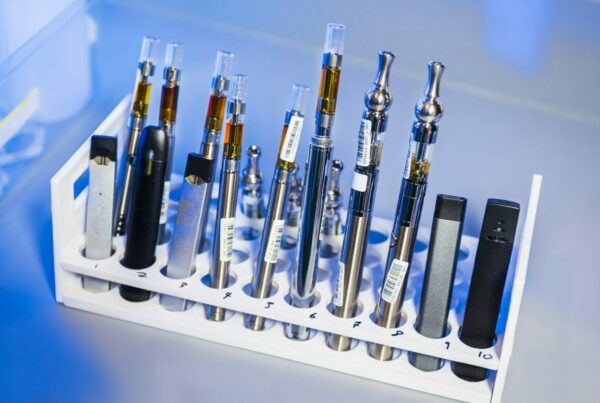N, N-Dimethyltryptamine (DMT) is a compound widely found in both plants and animals, known for its strong yet short-lasting psychedelic effects upon ingestion.
Emerging evidence indicates that DMT, naturally present in the body, plays important roles in both the peripheral and central nervous systems, possibly functioning as a neurotransmitter.
DMT can trigger powerful psychedelic experiences, while typically not causing many negative effects, except for possible cardiovascular problems when given in high doses through injection.
Let’s explore DMT and its various roles, from recreational usage to its promising potential in scientific research and therapeutic uses.

A Brief Introduction to DMT: What is it?
| Attribute | Information |
| Name | N, N-Dimethyltryptamine (DMT) |
| Type | Indole alkaloid |
| Presence | Naturally occurs in various plants and animals |
| Psychoactive Effects | Generates short, intense psychedelic experiences when consumed. |
| Method of Consumption | Can be smoked, injected, or ingested orally. |
| Effect Duration | Brief duration, typically between 5 to 30 minutes. |
| Chemical Structure | Comprises a tryptamine core with two methyl groups attached to the amine nitrogen atom. |
| Metabolism | Rapidly metabolized by the body, broken down by monoamine oxidase (MAO). |
| Cultural Use | Historically used in various ceremonial and shamanic rituals by indigenous cultures. |
| Synonyms | Dimitrifantasia, businessman’s trip, Businessman’s special, 45-minute psychosis, spiritual molecule |
The Importance of DMT in Mental Health
N, N-Dimethyltryptamine (DMT), a compound famous for its powerful psychedelic effects, is garnering attention for its potential benefits to mental health. Despite its conventional association with intense visionary experiences, recent research suggests a connection between DMT and mental wellness.
Influence on Psychological and Emotional Well-being
DMT’s psychedelic effects are renowned for eliciting intense emotional reactions and altering states of consciousness. This could potentially pave the path for therapeutic approaches to address mental health problems, aid emotional processing, and offer new perspectives on personal traumas.
Neuroplasticity and Brain Function
Research suggests that DMT could influence neuroplasticity, thereby enhancing the brain’s ability to adapt and restructure. Investigating its impact on synaptic plasticity and neural connectivity may yield potential treatments for conditions related to neural imbalances.
Potential Therapeutic Use for Mental Health Disorders
Initial studies underscore DMT’s potential for treating disorders such as depression, addiction, and PTSD. Its ability to initiate mystical or spiritual experiences could offer a novel approach to psychotherapy and assist in reforming negative thought structures.
Investigation into the natural presence of DMT in the body illuminates its role in mental health resilience, stress management, and overall psychological well-being. Understanding how the body regulates internal DMT levels could lead to innovative therapeutic strategies.
DMT and Mental Health Disorders
| Mental Health Disorder | Description | DMT’s Efficacy | Advantages |
| Depression | Defined as a mood disorder involving persistent sadness, disinterest, and reduced motivation | Initial research suggests DMT could alleviate symptoms by inducing deeply emotional experiences. | Its rapid onset and ability to trigger transformative experiences may present innovative therapeutic techniques for reshaping negative thought patterns and enhancing emotional processing |
| Post-Traumatic Stress Disorder (PTSD) | A mental health disorder resulting from traumatic events, leading to flashbacks, intense anxiety, and intrusive thoughts | Preliminary research points to DMT’s potential to manage symptoms by initiating spiritual or mystical experiences, which may help patients reframe traumatic memories | The potential of DMT to induce altered states of consciousness might assist in facilitating emotional processing and providing a fresh perspective on traumatic experiences |
| Addiction | A complex disorder characterized by compulsive engagement in rewarding stimuli despite adverse consequences | Some research suggests DMT’s potential role in breaking addictive patterns and lessening cravings for substances | DMT’s ability to trigger powerful and transformative experiences could help individuals modify their behavioural patterns and address underlying reasons for their addiction |
Approaches to Using DMT
DMT, renowned for instigating short, yet intense psychedelic experiences, can be administered in a variety of ways. The method of use often hinges on the desired intensity and duration of the experience.
Smoking:
DMT, when smoked in a pipe or vaporized, necessitates careful temperature control to avoid overheating and burning the compound. The psychedelic experience begins almost instantly when DMT is smoked, typically lasting from 5 to 15 minutes.
Oral Intake:
Taking DMT orally leads to slower onset effects that last considerably longer, often spanning several hours. This is attributed to the slower metabolism of DMT when combined with an MAOI.
Injection:
DMT can be directly injected into the bloodstream for quick and intense effects.
This method prompts an immediate and intense experience, but it necessitates precise dosage and carries higher risks.
Insufflation (Snorting):
Snorting DMT results in a slower onset of effects compared to smoking, but it could provide a more prolonged experience.
Sublingual or Buccal Administration:
When absorbed through the oral mucosa, this method presents an alternative to smoking and yields a longer, albeit less intense, experience.
Determining Therapeutic Dosage: N, N-Dimethyltryptamine (DMT)
For smoking, the suggested dosage is between 20 to 40 mg, while for intravenous use, the recommended dosage is 0.2 to 0.4 mg per kg of body weight. These dosage recommendations are primarily applicable to clinical research and are especially relevant for intravenous use.
- Higher doses given intravenously are associated with intense visuals, temporary loss of control, and a mixed state of anxiety and euphoria
- Intriguingly, lower doses have demonstrated less desirable effects
- Recreational doses of smoked DMT typically range from 40 to 50 mg, and can even go up to 100 mg
- Different doses of intravenous People who have had near-death experiences related to DMT (in 7, 14, 18, and 20 mg solutions) have reported lasting enhancements in their mental well-being.
Availability of DMT
ProductsOsmosis – 4-ACO-DMT Ethereal Essence Tincture
Advertised as containing 4-Acetoxy-N, N-dimethyltryptamine (4-AcO-DMT), a variant of DMT, this tincture is a liquid extract intended for oral consumption. It offers a distinct experience compared to conventional DMT.
Lucid Supply Co. – 5-MeO DMT Vaporizer
This vaporizer from Lucid Supply Co. dispenses 5-Methoxy-N, N-dimethyltryptamine (5-MeO-DMT). It is recognized for delivering powerful, transformative, and often brief experiences due to its active ingredient, 5-MeO-DMT.
Integral Alchemist – Acacia – 1ml DMT Vape Cartridge
The DMT vape cartridge from Integral Alchemist comes pre-loaded with N, N-Dimethyltryptamine and is likely aimed at those who favour a discreet and convenient DMT consumption method.
Deadhead Chemist – 5-Meo-DMT Cartridge
This cartridge from Deadhead Chemist contains 5-Methoxy-N, N-dimethyltryptamine (5-MeO-DMT), a substance noted for its deep and intense impacts.
The potential mental health benefits could be linked to personal growth, spiritual experiences, or therapeutic uses designed to enhance emotional well-being.
Deadhead Chemist – N, N DMT Cartridge
Another product from Deadhead Chemist, this cartridge is filled with the traditional N, N-Dimethyltryptamine. Such cartridges offer a straightforward consumption method for DMT, providing a more consistent and controlled experience.
Concluding Remarks
The consumption of N, N-Dimethyltryptamine (DMT) in
How do I responsibly explore DMT products?
It is recommended to acquire DMT products from reputable sources like Buy Shrooms Canada Online Dispensary, which not only provides a variety of options but also offers necessary guidance.
Embarking on the complex yet fascinating journey of mental health therapy offers tremendous potential. The ability of the compound to induce powerful but brief psychedelic experiences opens up new therapeutic possibilities.
Preliminary studies hint at its potential role in emotional regulation, self-improvement, and potentially
Given the profound influence of mental health treatment, it demands careful contemplation and judicious application.
Frequently Asked Questions:
How do various DMT products influence mental health differently?
For instance, vaporizers may induce instantaneous effects, whereas tinctures or vape cartridges may offer more controllable and steady doses.
Integrating derivative compounds or 5-MeO-DMT can result in different degrees of intensity and diverse mental health effects.
These nuanced differences underscore the importance of selecting a DMT product based on individual needs and mental health goals.
Can DMT lead to enduring changes in mental health and personal growth?
Anecdotal evidence suggests that DMT-induced experiences can lead to long-term enhancements in mental health and self-development.
Profound or transformational events, such as experiences akin to near-death, are often associated with continuous positive changes in psychological wellbeing and personal development.
While these experiences are intense yet temporary, they often stimulate introspection, spiritual discoveries, and a sensation of unity or enlightenment.
Many individuals report a refreshed perspective on life, improved emotional resilience, and a greater appreciation for existence following these experiences.
What is the optimal method to deploy DMT for mental health benefits?
Prudent decision-making, incorporating thorough research and comprehension of the compound’s effects, is essential.
Advice from mental health professionals or seasoned users can provide valuable perspective on potential risks and rewards.
Assessing personal tolerance and psychological readiness is also crucial, along with providing a supportive and secure setting for the experience.
What makes DMT different from other psychedelic therapies such as psilocybin or LSD in mental health treatment?
DMT stands out from other psychedelics like psilocybin or LSD when it comes to its effects, duration, and intensity.
High-intensity, short-acting psychedelics like DMT offer unique experiences which require distinct therapeutic strategies in mental health, differing from those applicable to longer-lasting psychedelics.
Recommended Additional Reading:





